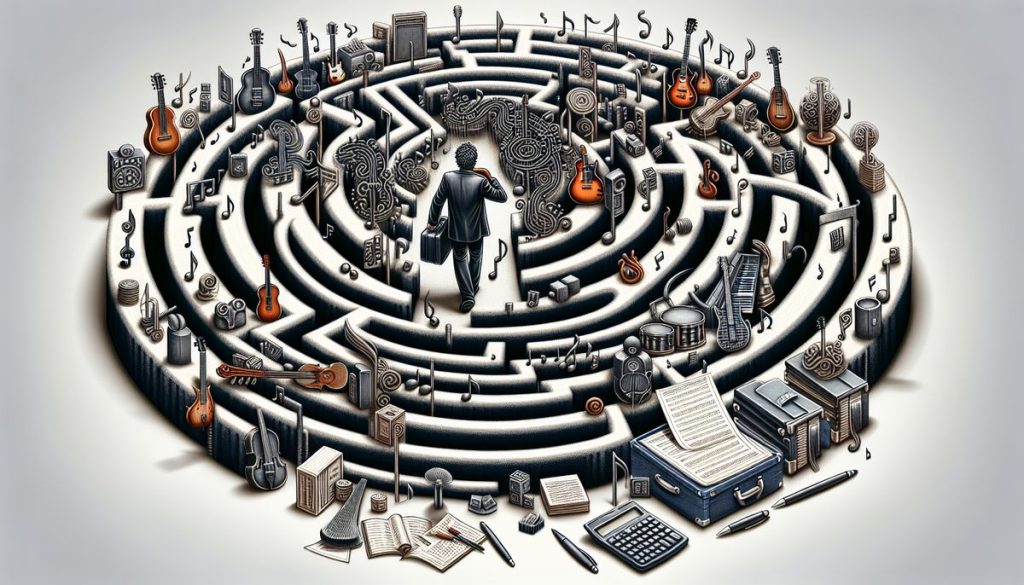Copyright and Trademark Law for Musicians: Protecting Your Intellectual Property
Written by DJ Prodigee on Tue Jan, 2024
Copyright and trademark law are essential for musicians to protect their intellectual property. This article provides an overview of copyright basics, the importance of trademarks, how to avoid copyright infringement, and tips for protecting your intellectual property. Here are the key takeaways:
Key Takeaways
- Copyright law protects the tangible expression of an idea, such as a musician’s performance or a writer’s book.
- Trademark law is important for musicians to protect their band name and merchandise.
- Avoid copyright infringement by understanding sampling laws and the art of parody.
- Registering your copyright is not always necessary but can provide additional protection.
- Using Creative Commons licenses allows you to share your work while still maintaining some control.
Why You Should Care About Copyright and Trademark Law

Because Nobody Wants to Steal Your Terrible Music
So you’ve written a song. Congratulations! Now, you might be thinking, who would want to steal my terrible music? Well, you never know! Maybe someone out there has a strange taste in music and thinks your terrible song is a masterpiece. And trust me, stranger things have happened in the music industry. So, it’s better to be safe than sorry. Protect your copyright and make sure no one can profit from your creative work without your permission.
But how do you do that? It’s simple! Copyright your songs. This way, you establish yourself as the lawful owner and ensure that you receive the royalties you deserve. Just imagine, even if your song becomes a hit like Elvis Presley’s, you could still be receiving royalty checks years later. Don’t miss out on that sweet, sweet cash!
And it’s not just about the money. Plagiarism is a real problem in the music industry. You don’t want someone else taking credit for your hard work and stealing your thunder. So, take the necessary steps to protect your intellectual property. It’s worth it!
Because You Don’t Want to Get Sued for Using Someone Else’s Terrible Music
So, you’ve found a song that perfectly captures the essence of your latest masterpiece. It’s catchy, it’s inspiring, and it’s…someone else’s terrible music. Before you hit that ‘share’ button, let’s talk about the potential legal consequences.
Using someone else’s copyrighted music without permission can land you in hot water. And trust me, you don’t want to be swimming in that legal mess. So here are a few tips to keep you out of trouble:
- Do your research: Make sure you have the rights to use the music. Check if it’s in the public domain or if you need to obtain a license.
- Create your own beats: Why rely on someone else’s terrible music when you can create your own? Get those creative juices flowing and make something unique.
- Get permission: If you absolutely must use someone else’s music, reach out to the artist or their representatives and ask for permission. It’s always better to be safe than sorry.
Remember, using someone else’s music without permission is like wearing someone else’s underwear—it’s just not a good idea. So be original, be creative, and most importantly, be respectful of other artists’ work.
Understanding Copyright Basics

What the Heck is Copyright Anyway?
Copyright is a term that gets thrown around a lot, but what does it really mean? Well, it’s like having a VIP pass to your own creative work. It’s the legal authority that gives you the power to control how your music is used and distributed. Without copyright, anyone could just take your masterpiece and claim it as their own. That would be like someone stealing your favorite guitar riff and pretending they came up with it. Not cool, right?
So, how does copyright work? Basically, when you create an original piece of music and fix it in a tangible form (like recording it or writing it down), you automatically have copyright protection. You don’t have to register it or do anything fancy. It’s yours, and no one can use it without your permission. But (and this is a big but), registering your copyright with the U.S. Copyright Office does give you some extra benefits, like the ability to sue someone for copyright infringement and the presumption of ownership in court.
Now, let’s talk about the exclusive rights that come with copyright. These rights are like the superpowers of the music world. With copyright, you have the right to reproduce your music (like making copies of your album), distribute it (like selling it on iTunes), publicly perform it (like playing a live show), display it (like showing off your album cover), and create derivative works based on the original (like making a remix or cover version). It’s like having control over every aspect of your music, from creation to distribution.
But wait, there’s more! Copyright also gives you the power to license your music. That means you can give someone else permission to use your music in certain ways, like in a movie or a commercial. And guess what? You can even make money from these licenses. So not only does copyright protect your music, but it can also be a source of income. Talk about a win-win!
Now that you know what copyright is and what it can do for you, it’s time to unleash your creativity and protect your intellectual property. Remember, your music is your baby, and copyright is like its bodyguard. So go out there, make some awesome tunes, and let copyright be your superhero sidekick!
How to Copyright Your Songs Without Breaking the Bank
You don’t need to mail anything to yourself. You already have a copyright in the song you’ve written simply by creating it. The moment you take your pen off the page and the last line is written, you have a copyright in the completed work. However, the important thing now is to protect your work so that others do not exploit it without your permission, or without paying you money. So if you plan to make widespread use of that song, by assigning it to a music publisher, recording it, or performing it, whether you or anyone else, you want to take steps to protect your copyright in that song.
Trademark Law: More Than Just a Fancy Logo

Why Trademarks Matter for Musicians
Trademarks used in the music industry are used to protect things like band names, logos and phrases related to specific song lyrics. In contrast to the protections provided by copyrights, trademarks protect things that help fans and consumers identify the source of the music. For a musician or band that sells merchandise, trademarks are an essential way to ensure that other parties are held accountable if they try to profit through the sale of counterfeit products.
How to Trademark Your Band Name and Look Cool Doing It
So you’ve come up with an awesome band name and you want to make sure no one else steals it. Trademarking your band name is not only a way to protect your intellectual property, but it also adds a level of professionalism and credibility to your brand. Plus, it’s a great way to look cool and stand out from the crowd. Here are some steps to help you trademark your band name and rock the legal world:
-
Do your research: Before you start the trademark process, make sure no one else is already using a similar name. You don’t want to get into any legal battles down the road.
-
File a trademark application: Once you’ve done your research and confirmed that your band name is unique, it’s time to file a trademark application. This can be done online through the United States Patent and Trademark Office (USPTO) website.
-
Hire a trademark attorney: While it’s not required, hiring a trademark attorney can help ensure that your application is filed correctly and increases your chances of approval.
-
Monitor your trademark: After your application is filed, it’s important to monitor your trademark to make sure no one else is infringing on your rights. Keep an eye out for any similar band names or logos that could cause confusion.
-
Enforce your trademark: If you do come across any infringement, it’s important to take action to protect your rights. This may involve sending cease and desist letters or even taking legal action if necessary.
Remember, trademarking your band name is an investment in your brand and can help set you apart in the music industry. So go ahead, trademark that name and rock on!
Avoiding Copyright Infringement: Don’t Be a Copycat

How to Avoid Getting Sued for Sampling
Sampling can be a fun and creative way to add a unique touch to your music. But before you start sampling like there’s no tomorrow, it’s important to understand the legal implications. Here are some tips to help you avoid getting sued for sampling:
-
Get sample clearance: If you’re unsure about whether you need sample clearance, you probably should try to get it. The costs of failing to obtain permission can be massive.
-
Be transformative: Transform the sampled material into something new and original. This can help protect you from claims of copyright infringement.
-
Use short samples: Limit the length of the samples you use to avoid potential legal issues.
-
Give credit where credit is due: Always credit the original artist or creator of the sampled material. This shows respect and can help establish a good relationship.
Remember, sampling can be a great tool for musicians, but it’s important to do it legally and responsibly.
The Art of Parody: How to Make Fun of Other People’s Songs Without Getting in Trouble
Parody is a great way to add some humor to your music without stepping on anyone’s toes. Boldly reimagining popular songs with clever and witty lyrics can create a hilarious and entertaining experience for your listeners. But how do you make sure you’re not crossing any legal lines? Here are some tips to help you navigate the world of parody:
- Put your own spin on it: When creating a parody, make sure to add your own unique twist to the song. This will help distinguish your work from the original and reduce the chances of copyright infringement.
- Avoid using the original recording: Instead of using the original recording of the song, try creating your own instrumental track or using royalty-free music. This will help you avoid any potential legal issues.
- Give credit where credit is due: While parody is protected under fair use, it’s always a good idea to give credit to the original artist. This shows respect for their work and can help avoid any misunderstandings.
Remember, the goal of parody is to entertain and make people laugh. By following these tips, you can create hilarious parodies without getting in trouble.
Protecting Your Intellectual Property: Tips and Tricks

Registering Your Copyright: Is It Really Necessary?
Registering your copyright is like putting a lock on your art. It’s that extra layer of protection that says, ‘Hands off, this is mine!’ Sure, you could leave your art unlocked and hope that nobody takes it, but why risk it? Registering your copyright gives you legal proof that you are the original creator and owner of your work. It’s like having a bouncer at the door of your art club, making sure only the right people get in.
But wait, you might be thinking, ‘Do I really need to register my copyright? Can’t I just rely on the fact that it’s my art?’ Well, you could, but let me tell you a little secret: registering your copyright gives you some superpowers. Here’s what you get:
-
Statutory damages: If someone infringes on your copyright, you can sue them for money. And not just any money, but statutory damages. That means you don’t have to prove how much money you lost because of the infringement. You can get a set amount of money just for being the copyright owner. It’s like winning the lottery, but with art.
-
Public record: When you register your copyright, it becomes part of the public record. That means anyone who wants to use your work can easily find out who owns it and how to contact you. It’s like having your art’s phone number listed in the Yellow Pages. And who knows, maybe a big-shot producer or gallery owner will see your work and give you a call.
-
Peace of mind: Let’s face it, art is personal. It’s a piece of your soul that you’re putting out into the world. And you don’t want someone to come along and steal that piece of your soul, do you? Registering your copyright gives you peace of mind, knowing that your art is protected and that you have the legal tools to defend it if necessary. So go ahead, put that lock on your art and sleep soundly at night.
Using Creative Commons Licenses: Sharing Is Caring, But Not Too Much
Using Creative Commons licenses can be a great way to share your work with others while still protecting your intellectual property. These licenses allow you to specify how others can use your content, whether it’s for commercial purposes, modifications, or simply giving you credit. But remember, sharing is caring, but not too much. Here are some tips to keep in mind when using Creative Commons licenses:
- Choose the right license for your needs. There are different types of Creative Commons licenses, so make sure to select the one that aligns with your intentions.
- Clearly communicate the terms of the license. Make it easy for others to understand what they can and cannot do with your work.
- Keep track of where your content is being used. Regularly check to see if others are abiding by the terms of your license.
Remember, using Creative Commons licenses can be a powerful tool for sharing your work, but it’s important to strike the right balance between openness and protection.
In Conclusion
So there you have it, folks! Copyright and trademark law may seem like a complicated maze, but with the right knowledge and legal tools, musicians can protect their intellectual property and ensure the success of their creative endeavors. Remember, originality is key, and trademarks are like the rockstar accessories that make your brand stand out. So rock on, protect your tunes, and let the world hear your unique sound!







